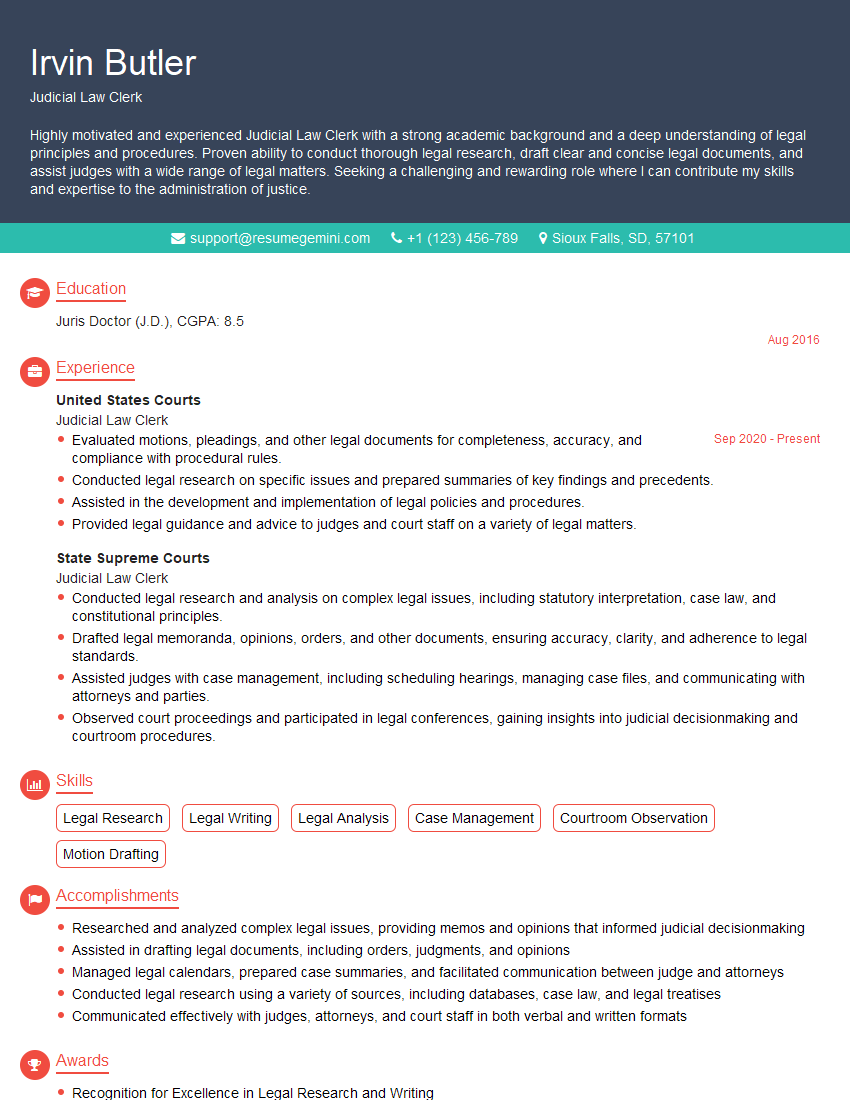Are you a seasoned Judicial Law Clerk seeking a new career path? Discover our professionally built Judicial Law Clerk Resume Template. This time-saving tool provides a solid foundation for your job search. Simply click “Edit Resume” to customize it with your unique experiences and achievements. Customize fonts and colors to match your personal style and increase your chances of landing your dream job. Explore more Resume Templates for additional options.

Irvin Butler
Judicial Law Clerk
Summary
Highly motivated and experienced Judicial Law Clerk with a strong academic background and a deep understanding of legal principles and procedures. Proven ability to conduct thorough legal research, draft clear and concise legal documents, and assist judges with a wide range of legal matters. Seeking a challenging and rewarding role where I can contribute my skills and expertise to the administration of justice.
Education
Juris Doctor (J.D.)
August 2016
Skills
- Legal Research
- Legal Writing
- Legal Analysis
- Case Management
- Courtroom Observation
- Motion Drafting
Work Experience
Judicial Law Clerk
- Evaluated motions, pleadings, and other legal documents for completeness, accuracy, and compliance with procedural rules.
- Conducted legal research on specific issues and prepared summaries of key findings and precedents.
- Assisted in the development and implementation of legal policies and procedures.
- Provided legal guidance and advice to judges and court staff on a variety of legal matters.
Judicial Law Clerk
- Conducted legal research and analysis on complex legal issues, including statutory interpretation, case law, and constitutional principles.
- Drafted legal memoranda, opinions, orders, and other documents, ensuring accuracy, clarity, and adherence to legal standards.
- Assisted judges with case management, including scheduling hearings, managing case files, and communicating with attorneys and parties.
- Observed court proceedings and participated in legal conferences, gaining insights into judicial decisionmaking and courtroom procedures.
Accomplishments
- Researched and analyzed complex legal issues, providing memos and opinions that informed judicial decisionmaking
- Assisted in drafting legal documents, including orders, judgments, and opinions
- Managed legal calendars, prepared case summaries, and facilitated communication between judge and attorneys
- Conducted legal research using a variety of sources, including databases, case law, and legal treatises
- Communicated effectively with judges, attorneys, and court staff in both verbal and written formats
Awards
- Recognition for Excellence in Legal Research and Writing
- Judicial Clerkship Award for Outstanding Performance
- State Bar Association Award for Legal Excellence
Certificates
- Certified Legal Professional
- Certified Paralegal
- National Association for Legal Assistants Paralegal Certification
- Legal Secretaries International Professional Legal Secretary
Career Expert Tips:
- Select the ideal resume template to showcase your professional experience effectively.
- Master the art of resume writing to highlight your unique qualifications and achievements.
- Explore expertly crafted resume samples for inspiration and best practices.
- Build your best resume for free this new year with ResumeGemini. Enjoy exclusive discounts on ATS optimized resume templates.
How To Write Resume For Judicial Law Clerk
- Highlight your legal research skills and experience by showcasing specific examples of complex legal issues you have analyzed.
- Demonstrate your writing ability by providing samples of your legal memoranda, opinions, or other legal documents.
- Emphasize your courtroom experience and knowledge of legal procedures by describing your observations of court proceedings and participation in legal conferences.
- Quantify your accomplishments whenever possible to demonstrate the impact of your work.
Essential Experience Highlights for a Strong Judicial Law Clerk Resume
- Conducted legal research and analysis on complex legal issues, including statutory interpretation, case law, and constitutional principles.
- Drafted legal memoranda, opinions, orders, and other documents, ensuring accuracy, clarity, and adherence to legal standards.
- Assisted judges with case management, including scheduling hearings, managing case files, and communicating with attorneys and parties.
- Observed court proceedings and participated in legal conferences, gaining insights into judicial decisionmaking and courtroom procedures.
- Evaluated motions, pleadings, and other legal documents for completeness, accuracy, and compliance with procedural rules.
Frequently Asked Questions (FAQ’s) For Judicial Law Clerk
What are the educational requirements for becoming a Judicial Law Clerk?
Typically, a Juris Doctor (J.D.) degree is required to become a Judicial Law Clerk.
What are the key skills and qualifications for Judicial Law Clerks?
Judicial Law Clerks should possess strong legal research, writing, and analytical skills, as well as a deep understanding of legal principles and procedures.
What are the typical responsibilities of Judicial Law Clerks?
Judicial Law Clerks assist judges with a wide range of legal matters, including conducting legal research, drafting legal documents, and managing case files.
What are the career advancement opportunities for Judicial Law Clerks?
Many Judicial Law Clerks go on to successful careers as attorneys, judges, or legal scholars.
How can I prepare for a career as a Judicial Law Clerk?
To prepare for a career as a Judicial Law Clerk, it is important to develop strong legal research, writing, and analytical skills. Additionally, gaining experience through internships or clerkships can be beneficial.
What is the salary range for Judicial Law Clerks?
The salary range for Judicial Law Clerks varies depending on factors such as experience, location, and the size of the court.
What is the job outlook for Judicial Law Clerks?
The job outlook for Judicial Law Clerks is expected to be competitive.